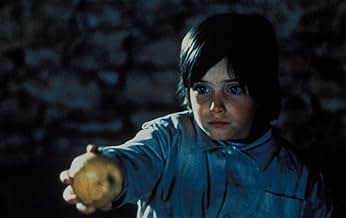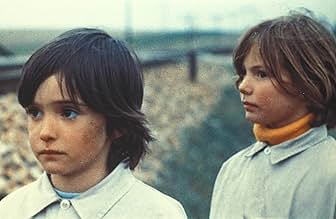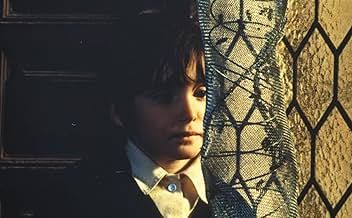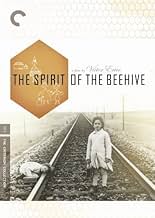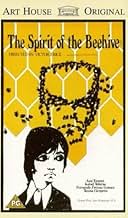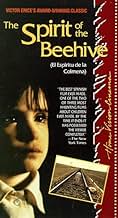En 1940, après avoir vu et été traumatisée par le film Frankenstein, une fillette sensible de sept ans vivant dans un petit village espagnol dérive dans son propre monde imaginaire.En 1940, après avoir vu et été traumatisée par le film Frankenstein, une fillette sensible de sept ans vivant dans un petit village espagnol dérive dans son propre monde imaginaire.En 1940, après avoir vu et été traumatisée par le film Frankenstein, une fillette sensible de sept ans vivant dans un petit village espagnol dérive dans son propre monde imaginaire.
- Réalisation
- Scénario
- Casting principal
- Récompenses
- 7 victoires et 1 nomination au total
Avis à la une
The story is elliptically told and demands your participation in making sense of the narrative, but it's also leisurely paced and allows you to breathe in the atmosphere rather than forcing a particular reading on you. One thing you wouldn't guess from reading the other comments is how this is as much a film about nature as about history--it is like a poem of the countryside in winter, with long vistas of stone farmhouses framed against the rising sun. The film with the most similar visual palette is Malick's "Days of Heaven", but that film feels simplistic compared to the full immersion in history and memory presented in this film--a much more complete vision of the past.
Ana Torrent is unforgettable. I can think of no better film about children, yet (as with so many other things in this movie) it doesn't feel forced--these kids aren't just the director's pawns, but real, living beings.
If you get a chance to see it, definitely make the effort.
Ana Torrent is a wide-eyed innocent who carries the film, as we completely enter into how she integrates her daily life, both the quotidian happenings and the unusual, with scary stories her older sister teases her with and with the film. Her beautiful eyes are expressive and haunting. As someone who had an older sister with all kinds of outlandish tales that were gullibly believed, the sibling teasing is the most natural I've seen on film.
Erice has a completely original take on the Frankenstein story, no matter how many times it has been referenced in other movies. "Ana" powerfully relates to the little girl in the film, even though she does not understand any of the darker emotions or outcomes. The film inspires her to seek out misfits and outcasts, with unintended consequences and impacts on the adult world.
The adult world is the weakest part of the film, or it's so heavy with symbolism about the 1940's period when the film takes place or of the end of Francoism in Spain when the film was made that it's lost for a viewer first seeing the film today. While sometimes the parents', teachers' and servants' behavior seems mysterious if we were just seeing it from her perspective, their obliviousness and self-involvement in their own intellectual and romantic pursuits aren't really explained, even as her father's pompous hobby somehow gives the film its title. It might be some sort of commentary on how adults have their own way of blending fantasy and reality or some other political commentary.
Seen in a new 35 MM print at NYC's Film Forum, the cinematography by Luis Cuadrado was stunning. The rural scenes of fields, forest and horizon --where dangers and threats always lurk beneath the pastoral--are beautiful, with simply gorgeous looking vignettes of childhood experiences.
I wonder if this insightful look inside a child's mind influenced such films as "I'm Not Scared (Io non ho paura)" and "Paperhouse." but the film seems so fresh and creative I was surprised that it was made in 1973.
Without using much dialogue in the movie, Erice artistically comments on the political tension in Spain through potent images and scenes. He uses symbols such as the two young sisters to represent the division between the Republican and Nationalist parties, and the leitmotif of the beehive to represent the "trapped" workers in Spain under Franco. The most amazing aspect is that all of the post-war commentary is said without any words and without mentioning the actual event! It is a "cine de espectáculo," or spectacle cinema, that symbolizes the connection between fantasy in the movies and fantasy in reality. Without knowing the history of Spain, a spectator could misinterpret the movie as a commentary about the imagination of a little girl after viewing the movie "Frankenstein." The character of Frankenstein is a main component contributing to Ana's, the younger sister, interpretation of reality in Spain, and it gains meaning as Frankenstein evolves from a character in the movie to an object of fantasy. It continues to evolve into a man of flesh and bones and finally represents the hope of Ana when all other sources of information in her life turn out to be faulty.
"El espíritu de la colmena" is a powerful movie that uses many metaphors (such as Ana for the young, innocent generation of Spain) to question the interpretation of reality. It is a powerful, artistically made movie that captivates the viewer through images rather than words. It should be seen more than once in order to understand all it's hidden messages.
While there is definitely a point to be made that this film is, first and foremost, a haunting look at the innocence of childhood, the subversive political meaning was something which is primarily the result of an attempt on my behalf to tie all the loose ends together, and the conclusion below is something I arrived at based on my own personal understanding of the narrative.
On the surface, The Spirit Of The Beehive is about a family which attempts to cope with the aftermath of the Spanish Civil War. It bears mentioning that the fact that this film even dares to address the conflict in such a direct manner suggests that, two years before Franco's death, the tight censorship regime in Spain was slowly but surely loosening its grip of the domestic film industry. Up to that point many films made in Spain during the Franco era were only able to address the civil war or Franco's regime in a strongly metaphorical manner or via subversive narratives (a case in point being much of Bunuel's work, albeit done in exile, or Saura's La Caza). In fact, much of Spanish cinema during that point in history can be regarded as an excellent case study in how allegories can be used as a way of averting tight censorship.
That said, political commentary on a tangible level would not have passed the censors even at such a late stage in Franco's reign, and thus most of the criticism in ...Colmena is driven by a sense of mutual understanding between spectator and narrative. The start of the film is a case in point: a shot of a few children watching James Whale's Frankenstein (with the narrator proclaiming that "You are about to see a monster") is followed by a cut to the girl protagonist's (Ana's) father. For now assuming that this narrative is driven exclusively by metaphors, does Victor Erice suggest, with that cut, that the girl's father is the "monster" in question? Or, does he, on a more profound level equate the word father to monster? Franco called himself the "father of the nation", and with that knowledge in mind an audience could easily read that scene as a highly ambiguous, yet still extremely effective, criticism of Franco (ie. suggestively calling Franco a monster). However, due to its strongly ambiguous nature, not a single censor would be able to pinpoint that scene and say, without any discernible doubt, that this is indeed the case. It's a wonderful example of allegorical film-making, and how film techniques can be generally used to make an intrinsic statement which relies as much to the techniques applied as it does on the audience's intelligence and ability to understand the more profound meaning behind the images.
I remember once reading the viewpoint that Ana herself represents the Spanish nation, and I can see what the intention of that statement is when you consider the monster=Franco equation I outlined above. The monster Ana meets in her daydreams (as she imagines meeting the Boris Karloff figure she saw at the Frankenstein screen) is a figure which lulls her into a false sense of security and turns out to be a threatening presence; and the symbolism itself becomes very plain once the monster=Franco and Ana=Spain (though I'll admit that this is not the most original reading of the film, and aditionally one which doesn't even begin to scrape at the amount of symbolism apparent).
If only Erice was as prolific as he is imaginative, since El Espiritu De La Colmena makes up for only one third of his entire output in over thirty years (his other two films being the equally brilliant El Sur and Quince Tree Of The Sun). Needless to say, it's cinematic genius, and a flawless work of art bar none.
Le saviez-vous
- AnecdotesCinematographer Luis Cuadrado was going blind at the time this film was made. An assistant would take Polaroids of the scenes and Cuadrado would direct the lighting by looking through a magnifying glass at these pictures. In 1980 Cuadrado committed suicide after he went completely blind and the tumor in his brain became too painful to face.
- GaffesWhen the fugitive jumps from the train and rolls down the hill, he's wearing boots, but in the next shot he's wearing low-cut shoes.
- Citations
Ana: [unable to sleep] Isabel?
Isabel: [opening her eyes] What?
Ana: [whispering] Tell me what you were going to tell me.
Isabel: [whispering] About what?
Ana: The movie.
Isabel: Not now... Tomorrow.
Ana: Now... You promised. Why did he kill the girl, and why did they kill him after that?... You don't know - you're a liar.
Isabel: They didn't kill him, and he didn't kill the girl.
Ana: How do you know? How do you know they didn't die?
Isabel: Everything in the movies is fake. It's all a trick. Besides, I've seen him alive.
Ana: Where?
Isabel: In a place I know near the village. People can't see him. He only comes out at night.
Ana: Is he a ghost?
Isabel: No, he's a spirit.
Isabel: Like the spirit Dona Lucia talks about?
Isabel: Yes, but spirits have no bodies. That's why you can't kill them.
Ana: But he had one in the movie. He had arms and feet. He had everything.
Isabel: It's a disguise they put on when they go outside...
Ana: If he only comes out at night, how can you talk to him?
Isabel: I told you he was a spirit. If you're his friend, you can talk to him whenever you want. Just close your eyes and call him... It's me, Ana... It's me Ana...
[they hear what sounds like ominous footsteps and are silent]
- ConnexionsFeatured in Sus años dorados (1980)
- Bandes originalesOjos verdes
Written by Salvador Valverde (as Valverde), Rafael de León (as León) y Manuel L. Quiroga (as Quiroga)
Meilleurs choix
Détails
- Date de sortie
- Pays d’origine
- Site officiel
- Langue
- Aussi connu sous le nom de
- The Spirit of the Beehive
- Lieux de tournage
- Hoyuelos, Segovia, Castilla y León, Espagne(Town and exteriors)
- Sociétés de production
- Voir plus de crédits d'entreprise sur IMDbPro
Box-office
- Montant brut mondial
- 190 734 $US
- Durée1 heure 38 minutes
- Mixage
- Rapport de forme
- 1.66 : 1
Contribuer à cette page


![Regarder Tráiler [OV]](https://m.media-amazon.com/images/M/MV5BZDcyMjExODEtZGJlYy00MGNmLWJhZTItNzQ5MTNjNzAzNDQ2XkEyXkFqcGdeQXRyYW5zY29kZS13b3JrZmxvdw@@._V1_QL75_UX500_CR0)
